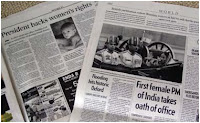Better humans than we are would use their intellects and the attainments of civilization to end the fury of war. War would not be a problem for them at all. They would see it simply as a barbarous state, opposed to civilization—an absurd and incomprehensible phenomenon, as expendable and defeatable as the plague. (Maria Montessori, Peace and Education, 1932)
Maria Montessori endured living through both World Wars. She watched as European nations crumbled under self-serving dictators. Forced into exile by the fascist regime of Benito Mussolini, Maria Montessori moved to India and turned her vision toward education and World Peace.
… they will be witnesses to the unfolding of the human soul and to the rising of a New Man who will not be a victim of events, but will have the clarity of vision to direct and shape the future of human society. (Maria Montessori, Education for a New World)
Civics, or Civic Education, is the course of study which applies knowledge of history and cultural geography to the world today. Aligned with Montessori’s vision of Cosmic Education and Peace, civics uses the study of state and local governments and the Common Needs of Humans to help children prepare to become citizens of the world. Children explore such common global themes such justice, law and morality, genocide, and religious and racial persecution. And they learn what it means to be a participating member of a community.
Teaching Civics in the Montessori Classroom
 Most importantly, studying civics helps children become problem solvers. Working together, they challenge each other to creatively find solutions to social injustices. As a community, they choose an issue that matters to them and decide on a course of action to seek change. Working together with peers and adults, young people are able to enact change that might otherwise have been ignored.
Most importantly, studying civics helps children become problem solvers. Working together, they challenge each other to creatively find solutions to social injustices. As a community, they choose an issue that matters to them and decide on a course of action to seek change. Working together with peers and adults, young people are able to enact change that might otherwise have been ignored.Education either functions as an instrument which is used to facilitate integration of the younger generation into the logic of the present system and bring about conformity or it becomes the practice of freedom, the means by which men and women deal critically and creatively with reality and discover how to participate in the transformation of their world. (Paulo Freire, 1968)
Our job as Montessori teachers is to empower children to become the next world leaders. Civic education provides them the tools early on to be harbingers of peace and catalysts for change.
To learn more about teaching civics, as well as helpful teaching plans, please visit:
- ImagineAction
- Constitutional Rights Foundation
- World Movement for Democracy
- Center for Civic Education
- Montessori Muddle

As much as possible, NAMC’s web blog reflects the Montessori curriculum as provided in its teacher training programs. We realize and respect that Montessori schools are unique and may vary their schedules and offerings in accordance with the needs of their individual communities. We hope that our readers will find our articles useful and inspiring as a contribution to the global Montessori community.
© North American Montessori Center - originally posted in its entirety at Montessori Teacher Training on Tuesday, March 29, 2011.
© North American Montessori Center - originally posted in its entirety at Montessori Teacher Training on Tuesday, March 29, 2011.



0 comments:
Post a Comment
Have questions or comments? Let us know what you thought about this article!
We appreciate feedback and love to discuss with our readers further.